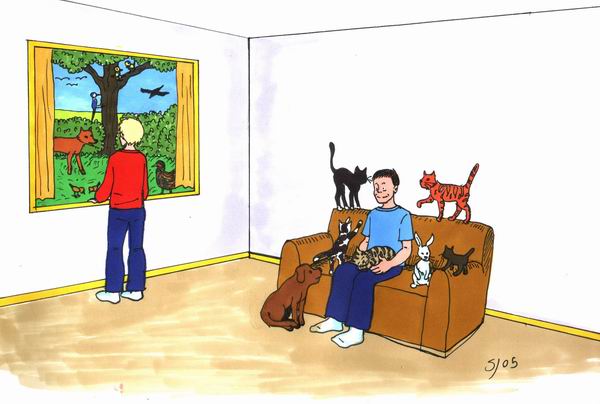Respect, freedom and compassion |
Respect is the combination of involvement and keeping enough distance
What is respect?
When there is a toddler in the house, crawling around, the parents are vigilant. Little children open cupboards, put everything they encounter into their mouths, etc. Beyond fear and uncertainty, children do not hesitate to explore the space around them. Similarly, a pet that is crawling or flying around does not have much respect for the furniture of its house owner. A child is able to learn how to behave, but for a pet, this is only achieved through punishment. That means that punishment becomes a negative incentive for "not giving respect" to the surrounding things.
On this site respect is defined by the right combination of being involved ("love") and keeping an appropriate distance ("freedom"): you are allowed to take a close look, but you are not allowed to touch. |
Why is showing respect so difficult?
Adults are sometimes not very precise in how they define respect, making it difficult for little children to cooperate with them. Parents expect their children to interpret their raised voices as a proclamation to "show a little respect!". This little information is to be translated by the child as an assignment for learning proper behavior without further details. So this makes showing respect a difficult task. |
Setting boundaries
Man is the most forceful living creature on earth. Without forcing boundaries upon him/herself or upon farms, there would not be enough space within which to live. Both humans and animals do not take rules for granted. In some cases it's permitted to force respect upon others. In the old days respect was won by means of friendly fights (games). For animals this is still the way to discover who will be the future leader of the pack and who will be more submissive. When an animal shows its weakness to another, lower in rank, the lower animal seeks to take over a higher position. |
From force to intrinsic motivation
So, force and power are only temporary means to receive respect and call for subversive action whenever possible. It would be a good thing if humans spontaneously paid due respect to animals. Respect should lead to a healthy equilibrium, which is more than the result of two equal countering forces (love and freedom). It would be even better if humans were motivated to seek balance by positive rather than economical incentives.
Therefore it is important that people develop from within (themselves) the right compassion for everything alive. That is a positive image of human motivation, in which one should not follow blindly. It will not automatically work out fine when everyone is held responsible for the proper way of showing respect. Being afraid of distrust is rather a form of indifference than of being concerned. |
 |
Practical application: the right distance
People with little children make their house a safe haven for kids to play. Vulnerable spots in nature, where the public is welcome to dwell, are protected by natural limits which can be constructed by simply raising the level of groundwater. Sure, this is a negative way to set the proper distance, but the upside is that no fences need to be built and no surveillance is necessary. |
Animal love and egoism
People love pets, but what is the nature of their affection?
Further, people like to approach wild animals to get a better look by using binoculars to get as close as possible. If you come too close, however, wild animals become disturbed and flee. Except during the time that they breed, this is not a sin.
Some people choose to have a pet as companions at all times, a fairly egoistic motivation to enjoy the existence of other creatures. Cats and dogs don't mind however, as they have become accustomed to living in human vicinity for a very long time. |
True love and surrogate love
Some people do not see the difference between loving animals and keeping them. Mixing up these concepts shows that some pet owners do not have any clue of what respect really means. An animal has the right to behave naturally and does not depend upon human affection (for its well-being). Of course man has the obligation to take care of the physiological needs of the captured animal and certainly, the animal will show signs of appreciation. But that is not affection. It certainly is not real love, not even surrogate love. |
The ideal situation: true encounter
 What a wonderful world it would be if people would help animals to manage their own lives in a natural surrounding. Interconnected habitats are optimal for the migration of all living creatures, especially when circumstances deteriorate, e.g. when forced to move by famine or overpopulation. Furthermore when hunters stop shooting for pleasure or just for the fun of power play, animals will appreciate man as a harmless creature and not as a threat to its existence. What a wonderful world it would be if people would help animals to manage their own lives in a natural surrounding. Interconnected habitats are optimal for the migration of all living creatures, especially when circumstances deteriorate, e.g. when forced to move by famine or overpopulation. Furthermore when hunters stop shooting for pleasure or just for the fun of power play, animals will appreciate man as a harmless creature and not as a threat to its existence.
Only then can a truly respectful encounter take place between human beings and animals. After that both can go their own way, just as the quality of true love is accompanied by letting go ("no strings attached"). |
|
|
|
|
| |

